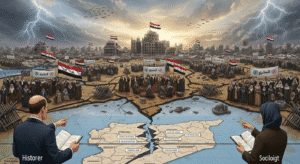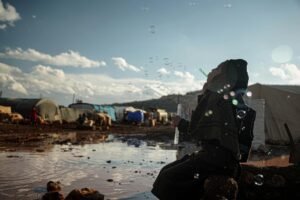Executive Summary
Syria faces a devastating “polycrisis.” The growing impacts of climate change are deeply connected to years of poor governance, a brutal conflict lasting over a decade, and a severe economic collapse. This report argues these are not separate problems. Instead, they are part of a single, widespread failure. Environmental damage has both driven the conflict and blocked paths to peace.
Our main point is this: lasting peace and a legitimate future Syrian state depend on addressing environmental security. A stable and strong Syria must be built on two key ideas: environmental justice and green reconstruction. These are not minor issues to be fixed later. They are essential for any political agreement to succeed.
The Crisis Explained
Syria is a global climate hotspot. It faces a severe water crisis, made worse by climate change and regional issues. This has caused the farming sector to collapse. Now, 14.5 million people lack enough food, leading to new waves of displacement due to climate issues. Two-thirds of the country’s water and sanitation systems are destroyed. This has led to repeated public health disasters, including widespread cholera outbreaks. The humanitarian crisis, once caused by direct violence, is now mainly driven by these ongoing environmental pressures.
Justice and Accountability
Syria’s new efforts for transitional justice might fail if they ignore the environmental and economic problems that sparked the 2011 uprising. For justice to matter and peace to last, we must expand accountability to include environmental damage. Looking at examples from Colombia and Iraq, this report suggests a combined approach for environmental accountability. This includes:
A UN-led Post-Conflict Environmental Assessment to create clear evidence of the damage.
An Environmental Remediation and Compensation Fund, funded by seized assets and international help, to pay for cleanup and reparations.
Creating a new, independent National Environmental Protection Agency to prevent past mistakes from happening again.
A Plan for a Resilient Future
The widespread destruction in Syria offers a unique chance. We can build new systems that avoid the failed, polluting, and vulnerable approaches of the past. Rebuilding with “brown” (fossil fuel-based) methods would lead to future crises. It would also leave assets stranded as the world moves away from carbon. A green reconstruction is the smartest financial and security choice. This report outlines a plan, including:
A required Syrian Green Building Code to ensure all new construction saves energy and water.
A national shift to Climate-Smart Agriculture. This means ending harmful subsidies and promoting crops that resist drought, along with modern irrigation.
A strategic move to decentralised renewable energy. This will improve grid stability and help Syria achieve energy independence.
Funding and Recommendations
Raising the necessary money is a huge challenge. However, the recent easing of international sanctions opens a key opportunity. We need a mixed finance strategy. This should combine grants, special climate funds, and de-risked private money. The international community has a vital role. It must set strict green conditions on all reconstruction funding. This will guide the recovery towards a sustainable path.
Conclusion
Syria’s polycrisis is a clear warning. It shows how climate change, conflict, and bad governance can create a terrible cycle of collapse. Technical and financial solutions for a green and fair recovery exist. But the chance to use them is still mostly theoretical. Success depends on a lasting political agreement, rebuilding effective state institutions, and a strong, combined effort from both Syrian and international groups. Without a brave strategy that puts environmental restoration and justice first, Syria faces a continuous decline. A damaged environment will fuel fragility and conflict for generations. The choice is clear, and time is running out.




